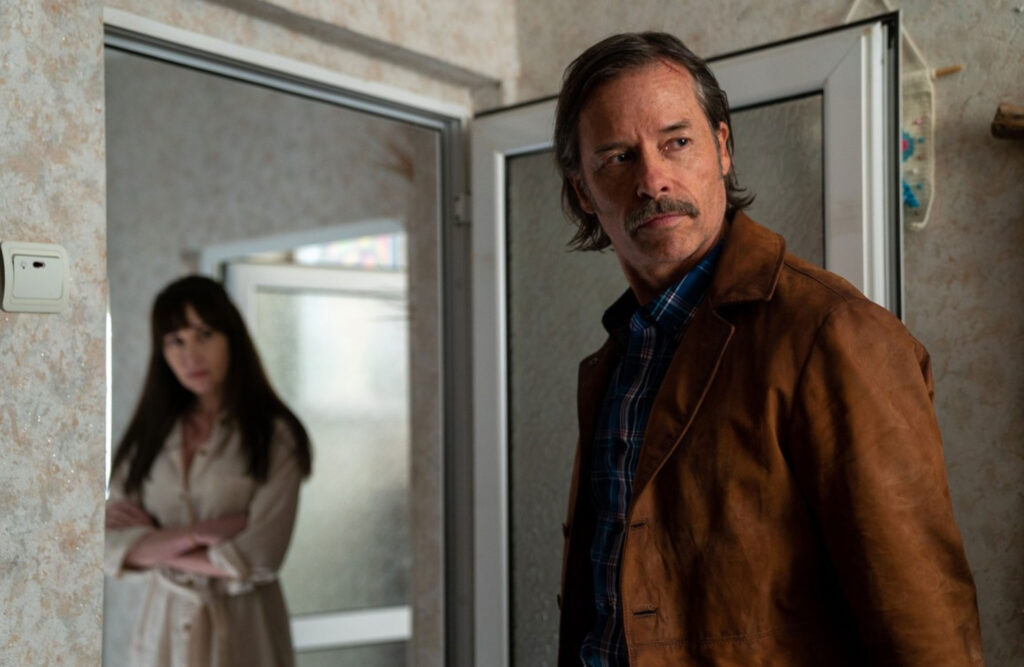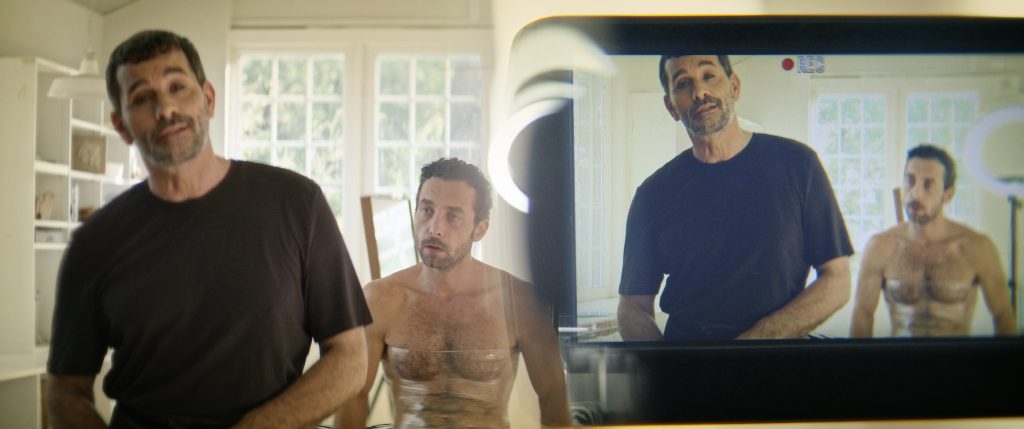April 12, 2023
by Carla Hay

Directed by Catherine Hardwicke
Culture Representation: Taking place in Italy and briefly in the Los Angeles area, the comedy/drama film “Mafia Mamma” features a predominantly white cast of characters (with a few African Americans) representing the working-class, middle-class, wealthy and criminal underground.
Culture Clash: An “empty nester” Italian American mother finds out that her recently deceased grandfather in Italy was a Mafia boss whose dying wish was for her to take over the family’s Mafia business in Italy.
Culture Audience: “Mafia Mamma” will appeal primarily to fans of stars Toni Collette and Monica Bellucci, as well as anyone to doesn’t mind watching idiotic movies about the Italian Mafia.

“Mafia Mamma” is an irritating mix of crude comedy and cloying drama failing on every single level. The filmmakers want to fool viewers into thinking that Toni Collette’s shrill and mindless Kristin character is supposed to exemplify “female empowerment.” Collette can usually be counted on to give good performances in even her worst movies. However, Collette (who is one of the producers of “Mafia Mamma”) does nothing but embarrass herself in this moronic and schlocky mess. The rest of the “Mafia Mamma” cast members give equally atrocious or forgettable performances, made worse by the misguided direction and awful screenplay.
Directed by Catherine Hardwicke, “Mafia Mamma” was written by J. Michael Feldman and Debbie Jhoon, as if it were a stale and outdated movie from the 1980s. It’s the type of comedy/drama that Goldie Hawn might have made back then, when movie audiences were more receptive to seeing someone act like a ditzy blonde who’s thrown into uncomfortable situations while she shrieks, grimaces, and whines about how she doesn’t know how she ended up in these situations. To make things even worse, “Mafia Mamma” tries to pretend that it’s a “feminist” movie, when it’s actually the opposite of a feminist movie, because it makes the female characters in film look very shallow.
And let’s not get started on the utter stupidity of the concept that a powerful Mafia family in Italy would want a naïve and estranged relative, who doesn’t speak Italian, to suddenly take over the family’s Mafia empire in Italy. Even if viewers suspend their disbelief at this flimsy premise for “Mafia Mamma,” the cast members do a terrible job of selling this concept as entertaining. There’s a desperate tone to “Mafia Mamma” that’s very off-putting. It’s like being stuck in a room with people telling bad jokes that they know are bad, but they just ramp up the barrage of foolishness, because they want to convince you that being louder and sillier automatically means “funnier.”
“Mafia Mamma” begins with a scene showing the aftermath of a gun massacre somewhere on a street in Italy. A Mafia general named Bianca (played by Monica Bellucci), who has an ice-cold personality, walks among the dead bodies of men and snarls, “This means war.” She then spits on the ground. Viewers soon find out that Bianca works for the Balbano crime family. And one of the people killed in this massacre was family boss Giuseppe Balbano (Alessandro Bressanello), whose dying wish was for his American-raised granddaughter to take over the family’s Mafia activities, even though this granddaughter has no idea that her family in Italy is in the Mafia.
This granddaughter is pharmaceutical marketing executive Kristin Dorner (played by Collette), who is living in the Los Angeles area with her musician husband Paul Dorner (played by Tim Daish), who is a wannabe rock star in an obscure band. It’s explained later in the movie that Kristin was born in Italy, but she and her widowed mother moved to the United States when Kristin was too young to remember her father, who was Giuseppe’s only child.
Kristin has no siblings. Her mother has been deceased for an untold number of years. Kristin is an overprotective mother to her only child: a son named Domenick, nicknamed Nicky (played by Tommy Rodger), who is seen saying goodbye to his parents as he drives off with two buddies for his first year in college in Portland, Oregon.
Kristin works at a company called ICO Pharma, which is always looking for new drugs to market to the public. She is the only woman in the small group meetings at her job, where the marketing executives have to pitch ideas for new campaigns. Kristin’s boss Hank (played by Jay Natelle) is misogynistic, even though he goes to great lengths to try to make it look he’s not.
Hank is dismissive of Kristin’s ideas and treats her as inferior to the male employees. He over-praises the unoriginal ideas of his male subordinates Randy (played by Yonv Joseph) and Wayne (played by Mitch Salm), which include re-using ad campaign ideas that portray women as sex objects. When Kristin pitches an idea for medication that will give hair growth to balding men, Hank suggests that Kristin work instead on a campaign for Restylane (anti-aging fillers) for women. Kristin’s job at ICO Pharma plays a big role in an awkward slapstick scene and in a nonsensical subplot shown later in the movie.
Kristin not only feels undervalued at work, but she’s also feeling lonely and unappreciated at home. In addition to having “empty nest syndrome,” Kristin has a non-existent sex life. She and Paul have not had sex with each other in three years.
Kristin is about to have a very bad day that will change her life. First, she gets a call from Bianca telling her that Kristin’s paternal grandfather Giuseppe has died in Italy. Even though Kristin never knew him, Kristin still feels a sense of loss that she never got to know this deceased family member.
And then, Kristin gets another bombshell: She walks in on Paul having sex in his music room with a younger woman named Tracy (played by Claire Palazzo), who was Domenick’s high school guidance counselor. Kristin is naturally shocked. It’s one of the few scenes where Kristin gets upset but doesn’t start screeching. An apologetic Paul uses the opportunity to tell Kristin that he wants them to have an open marriage.
Kristin is next seen taking out her anger and frustration in boxing exercises at a gym. Her gym partner is her loud and foul-mouthed best friend Jenny (played by Sophia Nomvete), who is an attorney for ICO Pharma. Jenny suggests that Kristin go to Italy for Giuseppe’s funeral and use the trip as a chance to reclaim her sexuality. Jenny crudely compares it to Elizabeth Gilbert’s 2006 self-discovery travel memoir “Eat Pray Love,” by saying Kristin’s trip to Italy can be like “Eat Pray Fuck” for Kristin.
“Mafia Mamma” is so poorly written, it isn’t mentioned what Kristin has decided to do about her marriage until after she arrives in Italy. It turns out that she and Paul are separated, but there’s no mention of her filing for divorce. At any rate, Kristin considers herself to be completely single and available. She wants to make one of her fantasies come true by having a romance (or at least passionate sex) with a handsome and attentive Italian man who treats her well.
As soon as Kristin arrives at the airport, and she’s outside in the arrivals/pickup area, she happens to meet an attractive 34-year-old stranger named Lorenzo (played by Giulio Corso), another traveler who’s standing nearby. Lorenzo’s aunt Esmerelda (played by Dora Romano) has arrived to give Lorenzo a car ride, and she’s in a hurry for him to get in the car. However, Lorenzo finds enough time to quickly introduce himself to Kristin, flirt with her, and exchange phone numbers with her. Of course, it won’t be the last time that Kristin sees Lorenzo.
Bianca is Kristin’s main guide in Italy, but two goons who work for the Balbano family are also at Kristin’s service: jittery Aldo (played by Francesco Mastroianni) and quiet Dante (played by Alfonso Perugini), who later become Kristin’s bodyguards. Dante’s body size becomes the butt of some unfunny “fat” jokes in the movie, which frequently makes Dante more concerned about gorging on fattening food than doing his job properly.
At first, Kristin thinks the Balbano side of her family has gotten wealthy from the Balbano winery. However, during Giuseppe’s funeral procession, there’s a shootout that leaves several people dead. Kristin and her entourage barely escape with their lives. A shocked Kristin demands to know what’s going on. And it’s how she finds out that the Balbano family is a Mafia family. The main Mafia enemy of the Balbano family is the Romano family.
Bianca also shows Kristin a video statement that Giuseppe made that he only wanted Kristin to see after he died. In the video, Giuseppe says that his dying wish is for Kristin to take over the family’s Mafia business. This announcement enrages Giuseppe’s great-nephew Fabrizio (played by Eduardo Scarpetta), a dimwitted, tattooed thug who was expecting to be named the leader of the family. It just leads to witless scenes of a rivalry that Fabrizio has with Kristin.
Throughout the movie, Kristin is a fast-talking, nervous chatterbox trying to make people like her, or she’s a screaming ninny trying to get out of a nasty situation. The movie has expected scenes of bloody murder, but there’s some gross-out comedy involving vomit and defecation that look really stupid and childish in a movie that needed a darker edge. The “fish out of water” scenarios for clueless Kristin get tiresome very quickly.
Even though Bellucci shares top billing with Collette, the Bianca character isn’t in the movie as much as she could have been, thereby squandering an opportunity to make the developing friendship between “opposite personalities” Kristin and Bianca into something hilarious. Instead, the movie lazily uses Bellucci’s image as a “sex symbol” to drop major hints that Bianca might be sexually attracted to Kristin, but Bianca doesn’t act on it. It comes across as being a tease just for the sake of being a tease and adds nothing to the story. Bianca is ultimately a hollow character who reveals nothing about herself in this junkpile film.
“Mafia Mamma” also mishandles what could have been the most suspenseful part of the movie: the rivalry between the Balbano family and the Romano family. The Romanos are too generic and uninteresting. Carlo Romano (played by Giuseppe Zeno) is the family boss at one point in the story, but he’s not in the movie for very long. A high-ranking family member named Mammone Romano (played by Vincenzo Pirrotta) is barely in the movie and doesn’t make much of an impact.
“Mafia Mamma” is also a bloated film that tries to cram in too many ideas, most of which have inexcusable plot holes and just make everyone involved look like morons. Nothing about the story and characters in “Mafia Mamma” looks believable. The movie becomes too long and drawn-out as more ludicrious plot twists emerge. There’s such an overload of bad acting and horrible comedy in “Mafia Mamma,” it truly is a crime against cinema.
Bleecker Street will release “Mafia Mamma” in U.S. cinemas on April 14, 2023. The movie will be released on digital and VOD on May 2, 2023.




